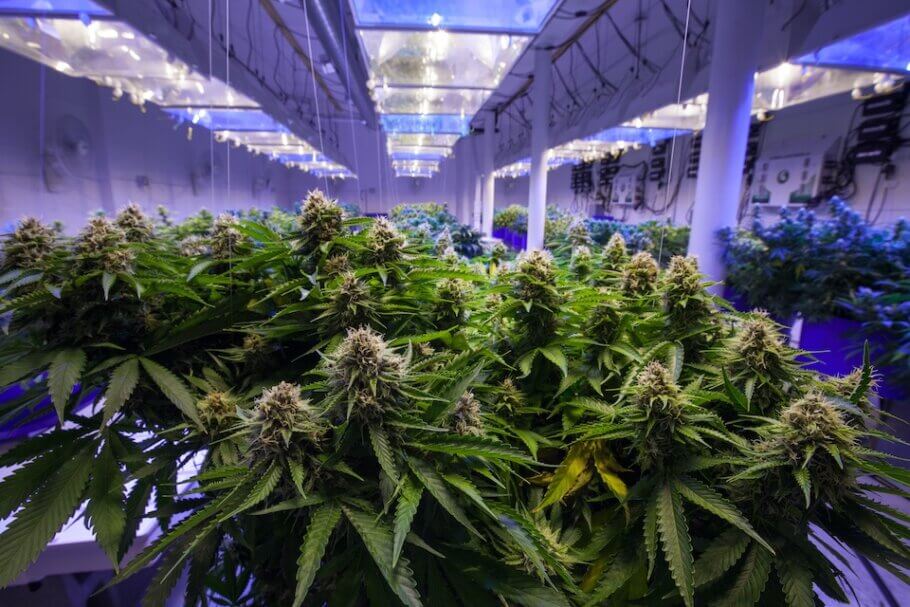‘Blockchain’ and cryptocurrencies in the cannabis industry
List of contents
Over recent years, the onset of legalisation in different countries has helped the cannabis industry take off, producing an explosion of weed-related companies, some of which have even gone public on the stock market.
The cannabis stocks being traded on these exchanges bear a striking resemblance to cryptocurrencies, as both are part of new and emerging industries that are still working towards normative regulation at all levels. And like cryptocurrencies, these stocks are experiencing high volatility as a result of the market still not understanding how to value these assets.
But at the same time, they hold a special attraction for small investors due to their ease of use and access. However, beyond cryptocurrencies, the true potential for the cannabis sector lies in blockchain, which is the underlying technology behind cryptocurrencies and a concept That could truly elevate the cannabis industry to a new high. a new level of transparency and security like never before seen.

Two emerging sectors operating in a twilight zone
Cannabis has long been declared an illegal substance, so the absence of regulation has made it difficult for many cannabis-related businesses to legally establish themselves in the proper way. However, laws and regulations are beginning to loosen up as governments recognise that the revenue potential of taxing cannabis use is far greater than anything gained by criminalising it.
Cryptocurrencies have also passed through a similar grey area, with many governments linking its use to money laundering, tax evasion, terrorist financing, and illegal drugs. These claims may have had some validity in the early days of blockchain but, in recent years, technology has evolved enough to offer viable solutions to problems related to banking, loans, logistics, as well as a wide range of social, financial, and economic challenges.
In fact, the word blockchain has been the talk of the tech industry since it emerged as a solution for securely tracking and tracing the exchange of cryptocurrencies. Conceived as a decentralised digital transaction ledger that is duplicated and distributed to every computer on a network, blockchain creates an unbreakable cryptographic signature called a hash that stores data in a way that cannot be disguised or manipulated, thus creating perfectly traceable records of all data interactions of a project throughout its life expectancy.
In this way, a blockchain can track anything from the sale and ownership of a few gold coins to the entire life cycle of a cannabis plant, from seed to final product in the form of flowers in a user's pocket. Everyone involved in the project has full visibility of an immutable and transparent account detailing every change, no matter how small, that the asset has undergone.

Governments around the world are slowly beginning to recognise the potential of blockchain technology to create more transparent and open systems and reduce red tape. Also, the large cryptocurrency exchanges that opted for ease of use to win over new users are now working towards addressing these concerns and achieving regulatory clarity for the entire crypto space.
Exploring blockchain use in the cannabis market
As we've already mentioned, blockchain can offer you all and any information regarding the life of a product, including its efficacy studies and consumer feedback; and all that in a system that can make it easily accessible to the various relevant parties that need to access it securely at any time. In the supply chain, it can bring much-needed integrity to this industry, something that could be critical to its mass popularisation.
The following are some of the ways blockchain-powered technology is already benefiting cannabis companies:
Fast and real-time traceability
Blockchain technology guarantees a permanent and accurate record, but also allows fast access to specific details within the large amounts of stored information. Companies can instantly see the complete history of a specific product and access current and past locations in the supply chain, from production centres to distribution points, preventing fraud or theft and locating any potential problems.

Providing consumers with an X-ray of the supply chain works to the benefit of brand owners, enabling them to build up consumer confidence in the consistency, quality, and safety of legal cannabis, thus reclaiming some of their business from the black market.
Blockchain is fundamentally based on transparency, and that's what the cannabis industry needs to overcome decades of obscurantism.
Monitoring the production process
just like pharmaceutical and biotech companies, cannabis producers must follow strict growing and processing guidelines to ensure safety and quality. There are problems with the control of pesticide use, the accuracy of nutrient solutions, storage temperatures, or hygiene measures that have to be adhered to.
For example, the manager and cultivation staff of a cannabis farm would verify and record on the blockchain the nutrient dosage or the amount of pesticide used; and blockchain will validate the processes as they occur so that plant care is supervised throughout all stages of its life cycle to verify the results and the authenticity of the product.
Greater efficiency and cost reduction
Labour remains one of the biggest expenses for cannabis companies, whether they operate grow facilities, retail stores, or both. Blockchain can streamline such time-consuming tasks as monitoring, reporting and audits, ultimately reducing the need for staffing and oversight related to those functions. Obviously, the start-up costs will be there, but in the long run, companies are likely to save money in this way.

Product validation and standardisation
One of the biggest potentials for this decentralised and distributed ledger that is the blockchain, in relation to cannabis, lies in genetics. Cannabis has long been identified by genetic crosses whose origin is not always entirely clear, as well as by strain names drawn from popular culture. Under blockchain-powered programs, information about genetic selection is collected, recorded, tested, and published through the secure and permanent infrastructure provided by the blockchain.
Thus, producers can protect their intellectual property while researchers can identify specific genetic and chemical profiles. Suppliers and retailers are guaranteed to receive consistent products with verifiable provenance, test results and other immutable information.
Efficiency in compliance with standards
For producers linked to the monitoring systems required by each countries' authorities, the power of blockchain lies in the compliance and application of the regulations. With blockchain, human error and the capacity for fraud are eliminated, completely removing any fear that a state or regulatory body may have that something has not been reported correctly. Being able to provide hard evidence of full compliance is a great advantage.
For example, a government can track cannabis provenance information by embedding a QR code in an item. The data is authenticated by placing it on the blockchain network and this information will determine if the seller has the legal right to sell these products and will also hold him responsible for any actions he takes, helping to halt any illegal cannabis use.
Consumer confidence: transparency, security, and authenticity
Scannable codes powered by blockchain and other blockchain-related technologies can increase transparency and provide end consumers with secure and verified product identification and information, to build trust and brand loyalty.
With blockchain, the consumer can be shown how one product is superior to another without having to deal with claims of bias or inaccuracies. It is very important from a consumer point of view to know exactly what they are buying and how they are getting it.

Cannabis and cryptocurrencies can also be good bedfellows
Beyond the significant advantages that the blockchain offers, cryptocurrency and cannabis businesses also have a lot in common. Both are currently entering the collective consciousness after years of operating in the shadows, and the two industries can help each other.
If cannabis companies embrace digital payments and get involved in resolving the problems created by these alternative systems, they can pave the way for other companies to do the same. Cryptocurrencies can help the cannabis industry access the financial services it needs and become less reliant on cash.
In fact, many see these tokens as a possible solution to the cannabis industry-wide banking problem faced in the US, which stems from the outdated status of DEA Annex I that classifies marijuana as a controlled substance, making it impossible for an entire industry to access banking institutions, essentially forcing cannabis companies to operate outside of secure financial systems.
It is not easy to do business when you cannot accept credit card payments and you are denied access to other services such as loans. This situation forces many cannabis companies to rely heavily on cash. And cash is far from ideal.
Cryptocurrencies offer a solution to this, as cryptocurrency exchange services are not regulated in the same way as banks, therefore it is much easier for companies to open accounts with them.

Sadly, the relationship between cryptocurrencies and cannabis is still in its infancy today, but it is highly likely to develop and flourish in the near future as levels of cryptocurrency adoption increase and technology becomes more sophisticated.
The most established cannabis cryptocurrencies
Bitcoin is the main cryptocurrency that popularly dominates the virtual space. However, there are alternative cryptocurrencies launched with an view to the cannabis industry and offering specific transactions for this sector.
BitCanna (BCNA)
When looking at these cryptocurrencies, one of the most well-established is BitCanna Coin (BCNA). BitCanna is a decentralized blockchain network created specifically for the cannabis industry, involving some of the most important cannabis companies and seed banks in Europe, with an impressive list of partners and suppliers that includes companies such as Alchimia, Barney's Farm and Royal Queen Seeds. Together, they form the BitCanna Alliance project, whose mission is to address the mass adoption and transparency of blockchain in the cannabis industry, providing a decentralised payment network, supply chain, and a network of trust for this sector.
To this end, BitCanna allows easy instant payments with minimal commissions (the transaction fees on the BitCanna blockchain itself are 0.0001 BCNA - approximately €0.00001 at the current market rate), which means that BitCanna can be used to pay in hundreds of online stores. The BitCanna mobile app uses a simple QR code payment system that combines the ease and convenience of shopping with a credit card with the unsurpassed privacy and security of cryptocurrencies. BitCanna offers the benefits of both, without any of the drawbacks. This means that making a purchase with BitCanna is as simple as it is completely anonymous: no information about the purchased products can be accessed by anyone else.

PotCoin or POT is another alternative currency launched in 2014 and which is also one of the most widely used in the sector; This cryptocurrency experienced a huge pump and subsequent dump after Dennis Rodman wore a POT jersey in his now-infamous 2018 reunion with North Korean leader Kim Jong-un. While the shirt, like the meeting itself, caused an international sensation, this kind of look is never healthy for a financial instrument intended for use as a long-term method of exchange. It now occupies a discreet position, #1135 on CoinMarketCap, a reference website that analyses the capitalisation of these digital assets.
Another one is CannabisCoin or CANN, also launched in 2014 and which operates to help companies carry out transactions with medical marijuana within North American dispensaries. This marijuana-based cryptocurrency also uses digital wallets to manage and store coins.
HempCoin (THC)
Another well-placed cryptocurrency is HempCoin (THC) which provides funding for the agricultural hemp industry and the use of medical or recreational cannabis in dispensaries. The purchase of tools and equipment for growing hemp can be done through the HempCoin website using this cryptocurrency.
DopeCoin (DOPE)
For its part, the mission of DopeCoin or DOPE is mainly to allow cannabis users to set up their businesses in a safer way. Based on its website, DOPE users can make transactions for free and pseudo-anonymously.
CannaCoin (CNN)
You also have CannaCoin or CNN, which operates under Peer2Peer (P2P) technology, which is a decentralised blockchain that works to develop future crypto applications in relation to the production, processing of biomass and other cannabis-related businesses.

And there are several more besides. However, the main issues these cannabis tokens encounter are adoption, market capitalisation, and targeting. Instead of bringing new technology together with innovative proposals, these ‘cannabis cryptos’ fail to address the problem the industry is facing, thus reducing their potential reach in the market.
This is because it is not enough that they are publicly related to cannabis. The problem lies in the fact that these cryptocurrencies are no different from any other cryptocurrencies. Therefore, most companies would prefer to use ETH, BTC, BNB, USDT, or any of the other dozens of major tokens that have been in development for years. In fact, it would be unwise for a cannabis company to rely on any of these existing cannabis cryptocurrencies without going through the more mature cryptocurrencies first.
Cannabis connection with small investors
Cryptocurrencies represent a new kind of digital money that users can store and transfer as if they were their own bank. Small investors are attracted to cryptocurrencies because they are relatively simple to understand, easy to access, and they allow them the freedom to spend and make transacttions without having to deal with the usual intermediaries who waste time and charge excessive fees.
However, cannabis stocks and cryptocurrencies are two types of assets belonging to emerging industries that are highly volatile, working towards regulated compliance, and are ubiquitous and easily accessible to small investors. These three factors make cannabis stocks and cryptocurrencies potentially very profitable to trade and invest in, but also very risky and unsafe compared to traditional stocks or bonds.
As these industries grow and mature, their volatility will eventually subside, meaning that more mainstream investment funds will welcome them into their portfolio. Until then, if you want to enter this world, this is the best recommendation: always proceed with caution, with money that you are not afraid of losing, and learn everything you can about where the short, medium and long term value is within each stock or cryptocurrency asset you own.
And remember the most important thing: it is the supply chain transparency offered by blockchain that will really benefit users in the legal cannabis industry. This will increase consumer confidence, which will undoubtedly lead to more people moving from the illegal to the legal market. As long as people can see the exact journey from seed to sale, the quality, safety and consistency of legal cannabis will speak for itself.

































































